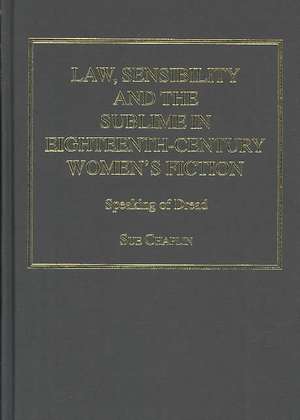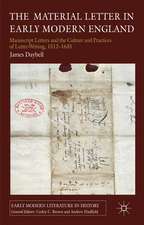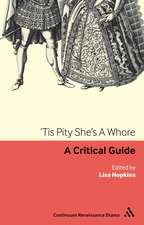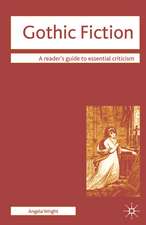Law, Sensibility and the Sublime in Eighteenth-Century Women's Fiction: Speaking of Dread
Autor Sue Chaplinen Limba Engleză Hardback – 27 apr 2004
| Toate formatele și edițiile | Preț | Express |
|---|---|---|
| Paperback (1) | 338.33 lei 6-8 săpt. | |
| Taylor & Francis – 11 noi 2016 | 338.33 lei 6-8 săpt. | |
| Hardback (1) | 736.38 lei 6-8 săpt. | |
| Taylor & Francis – 27 apr 2004 | 736.38 lei 6-8 săpt. |
Preț: 736.38 lei
Preț vechi: 989.73 lei
-26% Nou
Puncte Express: 1105
Preț estimativ în valută:
140.90€ • 147.12$ • 116.62£
140.90€ • 147.12$ • 116.62£
Carte tipărită la comandă
Livrare economică 04-18 aprilie
Preluare comenzi: 021 569.72.76
Specificații
ISBN-13: 9780754633068
ISBN-10: 0754633063
Pagini: 176
Dimensiuni: 153 x 219 x 17 mm
Greutate: 0.45 kg
Ediția:1
Editura: Taylor & Francis
Colecția Routledge
Locul publicării:Oxford, United Kingdom
ISBN-10: 0754633063
Pagini: 176
Dimensiuni: 153 x 219 x 17 mm
Greutate: 0.45 kg
Ediția:1
Editura: Taylor & Francis
Colecția Routledge
Locul publicării:Oxford, United Kingdom
Cuprins
Contents: Introduction: speaking of dread; Sublime bodies and bodies of law; A material transcendence: the Clarissa ideal; Femininity and the law of romance: Charlotte Lennox's The Female Quixote; The discipline of sensibility: Frances Sheridan's The Memoirs of Miss Sidney Bidulph; Speaking of dread: Eliza Fenwick's Secresy, or The Ruin of the Rock; Terror transcendence and control in Ann Radcliffe's The Italian and Charlotte Dacre's Zofloya, or The Moor; Conclusion; Bibliography; Index.
Notă biografică
Sue Chaplin is a Lecturer in English at Leeds Metropolitan University, UK.
Recenzii
'Its strength lies in Chaplin's ability to weave theoretical insight, historical research and textual analysis together in a series of tightly argued chapters...' BARS Bulletin and Review ’...the very real strengths of the book are its thoughtfulness, the pleasingly high ratio of ideas to words, and many illuminating and concise suggestions about the relation between culture and women's fiction.’ Eighteenth Century Fiction
Descriere
This work offers a fresh historical, philosophical and cultural interpretation of the relation between the eighteenth-century discourse of sensibility, the sublime and the theory and practice of eighteenth-century law. It exposes and explores the influence of this combination of discourses upon the formation of gender identities in the period and examines the presence, within eighteenth-century fiction by women, of a new female subject. Novels by women in this period, Chaplin posits, begin to reveal that the female subject position constructed through the discourses of law, sensibility and the sublime gives rise, for women, to a feminine ontological crisis that anticipates by two hundred years the trauma of the 'post modern' male subject unable to present a unified subjectivity to himself or to the world. This feminine crisis finds expression within a range of female fiction of the mid-to-late eighteenth century-in Charlotte Lennox's anti-romance satire, Frances Sheridan's 'conduct-book' novels, the Gothic romances of Radcliffe and Eliza Fenwick and the sensationalistic horror fiction of Charlotte Dacre.















